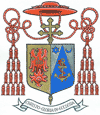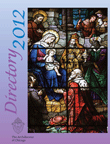
The Cardinal's Column
Francis Cardinal George, O.M.I.
To Christ be Glory in the Church, 2
Cardinal's Appointments
May 9, 2007
His Eminence, Francis Cardinal George announces the following appointments:
Pastor
Rev. John Jamnicky, from administrator of St. Matthew Parish, Schaumburg, to be the pastor of St. Raphael the Archangel Parish, Antioch, effective immediately.

Cardinal George's Schedule
- May 13: 12:30 p.m., Mother's Day Mass, Holy Name Cathedral
- May 14: 2 p.m., Finance Council Meeting
- May 15: 7:30 a.m., Big Shoulders Fund Board Meeting; 1 p.m., Priests' Day with the cardinal marking his 10th Anniversary as archbishop of Chicago, Mundelein
- May 17: 6 p.m., Mass, The Equestrian Order of the Holy Sepulchre of Jerusalem, Our Lady of Perpetual Help, Glenview
- May 18: 1 p.m., Administrative Council Meeting, Pastoral Center
- May 19: 8:15 a.m., Breakfast, Ordination Class of 2007, Quigley; 10 a.m., Priesthood Ordination Mass, Holy Name Cathedral; 5:30 p.m., 60th Anniversary Mass, St Philip the Apostle, Northfield
- May 20: 11 a.m., 100th Anniversary Mass, Ascension Parish, Oak Park
- May 21: 11 a.m., Gathering with Polish priests, St. Ferdinand; 7 p.m., Restore and Renew Campaign Dinner, Holy Name Cathedral
- May 22: 6 p.m., The Lumen Christi Institute Donors Dinner, Cardinal's Residence
- May 23: 10 a.m., Dedication of Catholic Charities' St. Vincent de Paul Residence; 7:30 p.m., presentation, De Paul University Catholic Studies Program
- May 24: 4:30 p.m., Lumen Christi Institute Colloquium on "Science, Philosophy and Theology", University of Chicago
- May 26: 11 a.m., Installation Mass, Sisters of the Holy Family of Nazareth Provincial House, Des Plaines
Reflecting on ten years as Archbishop of Chicago, I wrote in the last column about the signposts that have put some order into my own recall of my life and ministry as pastor to the Catholics of Cook and Lake counties. The Church is concerned always about her own life with the Lord, but she is also concerned about what she does for all those whom Christ loves. This outreach for the sake of justice and charity gives glory to Christ in the Church but for the world at large.
The Church’s social mission is defined by virtues embedded in the Gospel: truth, peace, freedom, love, justice. Sometimes these words are understood differently in the Gospel and in society. Justice, for example, means equality in modern society, but it means right relationship in Scripture. There is justice between God and ourselves when we are rightly related, not when we imagine ourselves equal to God.
The Church’s social mission has as its goal the creation of right relationships in society. At the very least, such relationships recognize and are founded on a respect for the dignity of every human person made in God’s image and likeness. At this level, there is equality of dignity, even though there are natural and vocational differences that also have to be respected. The Archdiocese of Chicago has a long history of concern for social justice as part of the Church’s mission here. Most recently, a concern for comprehensive reform of immigration policy stems from the need to respect every person, no matter his or her status in society. The State’s current desire to assure universal health care brings that moral issue to the political table. Other social justice concerns that I have tried to attend to in the past ten years are eradicating the violence that destroys not only respect for others but life itself, eliminating the racism that treats some people as inferior by reason of race or culture, working for affordable housing for all, defending religious freedom, supporting the struggle for peace abroad and for our own country’s right relationship to other nations.
The most fundamental concern in the Church’s social mission is respect for every life from the moment of conception to its end in natural death. On this issue, the difference between what the Church calls justice often differs greatly from society’s sense of justice. The Church always insists that something evil doesn’t become good just because someone chooses it or wants to do it. There’s a difference between people and their actions. This is easily understood when it comes to theft, for example. One can and should respect thieves, but that doesn’t mean we should approve of stealing. But the picture changes when society insists, for another example, that one cannot respect homosexually oriented people without approving of same sex “marriage.” People who should be respected can still do things that are morally wrong. To call right what is wrong is to turn the moral order on its head; and when the moral universe is disrupted, the civil society inevitably becomes disordered.
There’s nothing new or “progressive” about sin, whether personal or social. All the sins that fill our news programs have been around since the creation of the human race. What is always new and challenging is the grace that the Church brings for the transformation of the world. The Church’s social mission calls her to be an instrument of that grace everywhere. I have found myself confronted with the demands of that mission in Chicago and elsewhere: sitting on university boards and talking to university presidents, attending meetings of Roman committees and working for the national U.S. bishops’ conference, addressing groups from the business world and labor unions, speaking with lawyers and scholars of all stripes and sizes and, most of all, talking to poor people here and elsewhere. We reach out in justice and charity because we are a Eucharistic people. The Gospel defines the right relationship between Eucharist and the outside world when it says, “You yourselves, give them something to eat.” (Mt. 14:16) Evangelizing means not only announcing who Christ is but explaining also what it means to follow him. Being the Body of Christ is to practice a way of life, built on selfsacrifice for others, constructing a place where justice is at home. This is to give glory to Christ in the Church and for the world.
During this month of May, we ask the Blessed Virgin Mary, mother of the Church, to be with us on the way that is her Son and our Lord. My prayer is that the events surrounding the tenth anniversary of my coming to Chicago as Archbishop will move Mary to protect and foster our transformation in Christ, both personal and social. God bless you.
Sincerely yours in Christ,
Francis Cardinal George, OMI
Archbishop of Chicago



